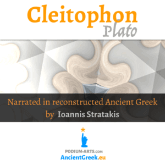• Cleitophon •
• Plato •

Duration: 17 m
Unabridged
Recorded: 2022
Price : $/€10
About the platonic Cleitophon
The platonic dialogue "Cleitophon" (Greek: «Κλειτοφῶν») is Plato's shortest work and a rather unusual one. Some scholars thought it's unfinished, others abandoned, lost, spurious and... all the usual has been suggested. Another interesting suggestion is the one claiming that Cleitophon is, or should be thought of as, a missing part of the Republic (Gr: «Πολιτεία»).
Seen in that light, the dialogue makes sense, also because the person Cleitophon is present in the "Republic", but doesn't converse with Socrates.
The dialogue is named from its main speaker, the sophist/rhetorician Cleitophon, whose spiritual needs are not really satisfied by the exhortations of Socrates. He needs more than words on the road to Virtue, but alas, only words his way come... So he decides to talk straight to Socrates about the rumours that he's going to prefer the teachings of Thrasymachus (Gr: «Θρασύμαχος») than the ones of Socrates. It is interesting that this is the only occasion in Plato's work, when Socrates appears in a quasi negative light; probably the main reason to doubt the authenticity of the dialogue.
You can follow the Greek or English text at "Perseus".
About Plato
Plato, the great philosopher of antiquity, is the best known disciple of Socrates and teacher of –among others- Aristotle (Gr: Ἀριστοτέλης). He was born in Athens in 427 BCE and descended from an aristocratic family. His father descended from King Codrus, (Gr: Κόδρος) while his mother was related to Solon. Thanks to the financial situation of his family he received a wide education and aspired to engage in politics. However, he gave up this desire, as his uncles Charmides (Gr: Χαρμίδης) and Critias (Gr: Κριτίας) were among the Thirty Tyrants. What, however, marked Plato’s life was his acquaintance with Socrates, at the age of 20. He remained by him for 9 years, and after the death of his master in 399 BCE he fled to the city of Megara.
He then made several voyages, to Egypt, Cyrene, Magna Grecia, and Sicily, where he came in contact with the Pythagoreans. Despite the relationship he developed with the tyrants of Syracuse Dionysius I, Dionysius II and Dion, he did not manage to turn them into Philosopher-Kings. On his return from the first voyage his life was in danger and he was sold as a slave. The 387 BCE he founded the “Academy” (Gr: Ἀκαδημία), where he taught for many years.
Plato’s surviving work is especially rich. 35 dialogues and 13 letters came down to us. The works considered genuine include 26 dialogues, the Apology of Socrates and the 7th Epistle, which is seems autobiographical. His works, besides the Apology and the Letters, are written in dialogue form. The central figure in the dialogues, except in the “Laws”, is Socrates. In no dialogue, however, does Plato himself appear. His dialogues are titled by the name of one of the participants, e.g. Timaeus, Gorgias, etc. Only six dialogues, the Symposium, the Republic, the Sophist, the Statesman, the Laws, and the Epinomis, were titled from their subject of inquiry.
You can read a concise biography here or here.
About the audiobook
 The recording contains the unabridged Ancient Greek text.
The recording contains the unabridged Ancient Greek text.
After purchase you will be able to download the relevant mp3 file.
You can listen to a short sample in the following video.
